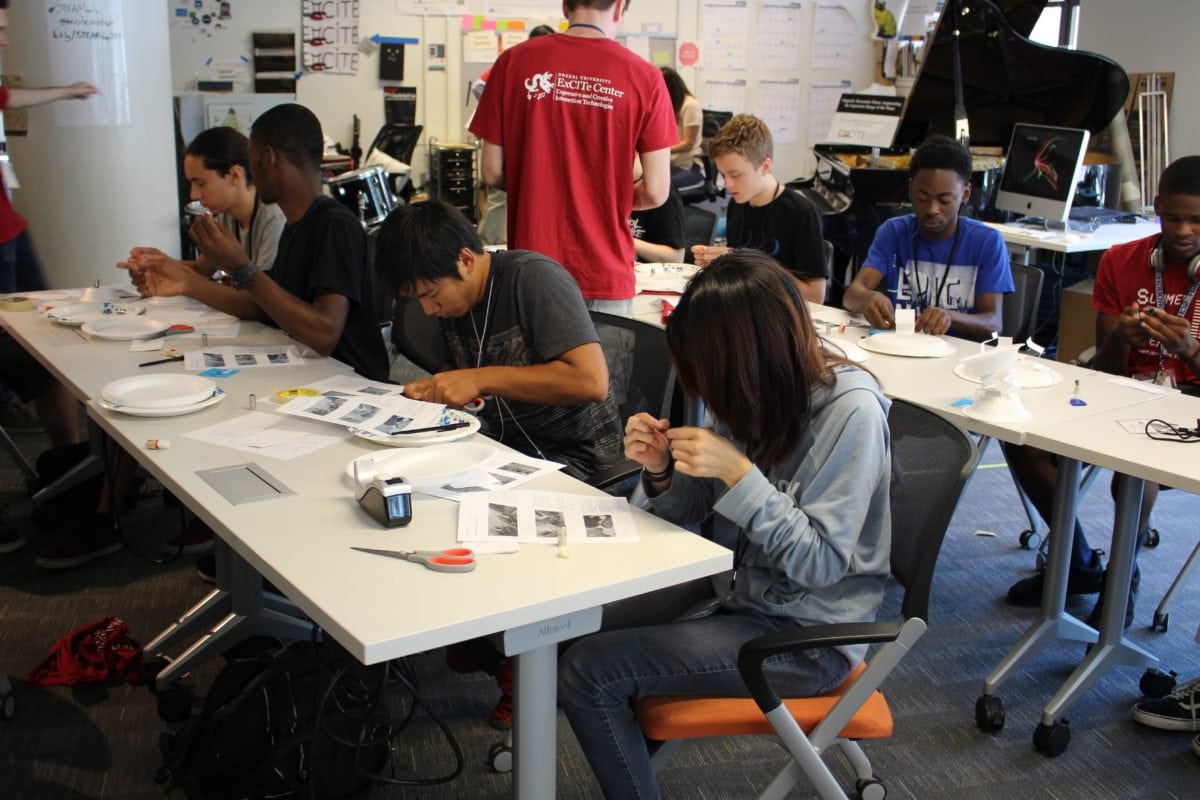After a 10-state tour through educational makerspaces (both in-school and off-site facilities with an educational penchant), researchers from Drexel University’s ExCITe Center found a non-inclusive culture with a lack of attention to implicit biases.
In a 19-page report titled “Making Culture: A national study of educational makerspaces,” the center revealed the results of a year-plus research project led by Drexel professor Brian Smith, in collaboration with postdoctoral fellow Dr. Kareem Edouard, graduate student Katelyn Bright and ExCITe Center Director Youngmoo Kim.
Per the study, student participation rates change dramatically from K-8 (where there’s nearly equal participation by gender) to high school (where male students outnumber females by a factor of three). Program leaders and instructors remain predominantly male, and a language analysis of recruiting and instruction materials revealed evidence of implicit bias.
“By and large the results in Philly match the national insights,” Kim told Technical.ly. “There are relatively few makerspaces so this is still an emerging phenomenon, but the most important recommendation from the study is that people who are considering opening a makerspace should first think deeply about the cultural aspects of that space.”
Often times, Kim said, aspiring makerspace creators within the educational space will ask what equipment they need to buy to establish a center.
“That’s the wrong question to start with,” Kim said. “Each space needs to identify and embrace their own learning culture. Just because something works well in other cities doesn’t mean it’s the right fit.”
Among other recommendations, the report suggests hosting unstructured open hours outside of class time can encourage greater exploration and positive risk-taking for a wider range of students.
“Implicit bias is pervasive and insidious,” the report states. “Our evidence is specific to gender, but there may be other forms. We recommend open and frank discussions that raise awareness of implicit bias, particularly in language, internal and external communications, and design curricula that may lead to bias.”
(Kim declined to specify which Philly spaces researchers looked at, but said the study looked at both in-school and off-site makerspaces that are open to the public. Last year, one makerspace, South Philly’s NextFab, faced a discrimination lawsuit from a former employee. NextFab employees told Technical.ly in March 2017 the space had “office culture issues regarding how male coworkers interacted with their female counterparts.”)
The most urgent recommendation, according to Kim, is to create concerted efforts around recruitment and language that combat existing bias in gender, race and beyond.
“I think this is quite common in the STEM field,” Kim said. “All you have to do is look at stats of 30 years in STEM education. There are still enormous disparities.”
Before you go...
Please consider supporting Technical.ly to keep our independent journalism strong. Unlike most business-focused media outlets, we don’t have a paywall. Instead, we count on your personal and organizational support.
3 ways to support our work:- Contribute to the Journalism Fund. Charitable giving ensures our information remains free and accessible for residents to discover workforce programs and entrepreneurship pathways. This includes philanthropic grants and individual tax-deductible donations from readers like you.
- Use our Preferred Partners. Our directory of vetted providers offers high-quality recommendations for services our readers need, and each referral supports our journalism.
- Use our services. If you need entrepreneurs and tech leaders to buy your services, are seeking technologists to hire or want more professionals to know about your ecosystem, Technical.ly has the biggest and most engaged audience in the mid-Atlantic. We help companies tell their stories and answer big questions to meet and serve our community.
Join our growing Slack community
Join 5,000 tech professionals and entrepreneurs in our community Slack today!

The person charged in the UnitedHealthcare CEO shooting had a ton of tech connections

From rejection to innovation: How I built a tool to beat AI hiring algorithms at their own game

How a laid-off AI enthusiast pivoted to become a founder — while holding down a day job


